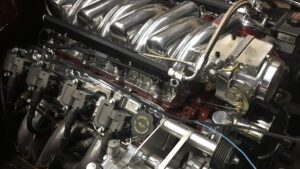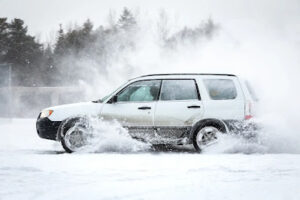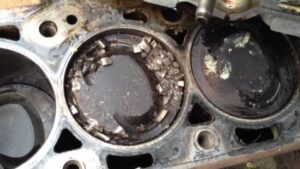Why Your Engine is Knocking When Cold and How to Solve It

Engine knocking when cold is a common issue that many car owners experience. It is characterized by a knocking or pinging sound coming from the engine when it is started or running in cold weather. While it may seem like a minor annoyance, engine knocking can actually be a sign of a more serious problem with your vehicle. In this article, we will explore the causes of engine knocking when cold, its impact on engine performance, and how to diagnose and fix the issue.
Addressing engine knocking when cold is important because it can lead to further damage to your engine if left untreated. Ignoring the problem can result in decreased engine performance, reduced fuel efficiency, and even engine failure. By understanding the causes of engine knocking and taking the necessary steps to diagnose and fix the issue, you can ensure that your vehicle runs smoothly and efficiently, even in cold weather.
Understanding Engine Knocking: What Causes It?
Engine knocking, also known as detonation, is a knocking or pinging sound that occurs when the air-fuel mixture in the combustion chamber ignites prematurely or unevenly. This can happen due to a variety of reasons, including incorrect ignition timing, low-quality fuel, carbon buildup in the combustion chamber, or excessive heat in the engine.
One of the most common causes of engine knocking is incorrect ignition timing. When the spark plug fires too early or too late in the combustion cycle, it can cause the air-fuel mixture to ignite unevenly, resulting in knocking sounds. Another common cause is low-quality fuel. If you are using fuel with a low octane rating, it can ignite prematurely and cause engine knocking.
Engine knocking can have a significant impact on engine performance. It can lead to decreased power output, reduced fuel efficiency, and increased emissions. The knocking sound itself is not only annoying but also indicates that something is wrong with your engine. If left untreated, engine knocking can cause serious damage to your engine, leading to costly repairs or even engine failure.
The Impact of Cold Weather on Engine Performance
Cold weather can have a significant impact on engine performance. When the temperature drops, the oil in your engine becomes thicker and less viscous. This can make it more difficult for the oil to flow smoothly through the engine, resulting in increased friction and wear. In addition, cold weather can cause the fuel to evaporate more slowly, leading to incomplete combustion and engine knocking.
Engine knocking is more common in cold weather because the cold temperatures can exacerbate existing issues in your engine. For example, if your engine has carbon buildup in the combustion chamber, the cold weather can cause the carbon deposits to harden and become more pronounced, leading to increased knocking. Similarly, if your ignition timing is slightly off, the cold weather can make the problem more noticeable.
Common Symptoms of Engine Knocking When Cold
One of the most obvious symptoms of engine knocking when cold is an audible knocking or pinging sound coming from the engine. This sound is often described as a metallic tapping or knocking noise and can be quite loud and noticeable. In addition to the knocking sound, you may also experience decreased engine performance. Your vehicle may feel sluggish or have reduced power output when accelerating.
Other symptoms to look out for include increased fuel consumption, rough idling, and increased emissions. If you notice any of these symptoms, it is important to address the issue promptly to prevent further damage to your engine.
How to Diagnose Engine Knocking: Tips and Tricks
Diagnosing engine knocking when cold can be a bit tricky, as there are several potential causes for the issue. However, there are a few steps you can take to help identify the root cause of the problem.
The first step in diagnosing engine knocking is to listen for the knocking sound. Start your vehicle and let it idle for a few minutes. If you hear a knocking or pinging sound coming from the engine, it is likely that you have an issue with engine knocking. Pay attention to when the knocking sound occurs – is it only when the engine is cold, or does it persist even after the engine has warmed up?
In addition to listening for the knocking sound, you can also perform a visual inspection of your engine. Look for any signs of carbon buildup in the combustion chamber or on the spark plugs. Excessive carbon deposits can contribute to engine knocking. You can also check the condition of your spark plugs and ignition system to ensure they are functioning properly.
To diagnose engine knocking more accurately, you may need to use specialized tools such as a scan tool or a stethoscope. A scan tool can help you identify any error codes or sensor readings that may be related to the issue. A stethoscope can be used to listen for abnormal sounds coming from different parts of the engine, helping you pinpoint the source of the knocking noise.
When diagnosing engine knocking, it is important to avoid common mistakes that can lead to misdiagnosis. For example, do not confuse engine knocking with other engine noises such as valve noise or piston slap. These noises may sound similar but have different causes and require different solutions. It is also important to consider other factors that may contribute to engine knocking, such as the quality of fuel you are using or the condition of your engine oil.
The Role of Engine Oil in Preventing Knocking
Engine oil plays a crucial role in preventing engine knocking. It acts as a lubricant, reducing friction between moving parts in the engine and preventing excessive wear. In addition, engine oil helps to dissipate heat and keep the engine cool, preventing overheating and potential damage.
Using the right type of engine oil is essential in preventing engine knocking. Different engines require different types of oil, so it is important to consult your vehicle’s owner’s manual or speak to a professional to determine the correct oil for your engine. Using the wrong type of oil can lead to increased friction and wear, which can contribute to engine knocking.
Regularly changing your engine oil is also important in preventing engine knocking. Over time, engine oil can become contaminated with dirt, debris, and other contaminants, reducing its effectiveness in lubricating and cooling the engine. It is recommended to change your engine oil every 3,000 to 5,000 miles or as recommended by your vehicle’s manufacturer.
Top Reasons Why Your Engine is Knocking When Cold
There are several common reasons why your engine may be knocking when cold. One of the most common causes is carbon buildup in the combustion chamber. Over time, carbon deposits can accumulate on the piston heads, cylinder walls, and valves, leading to increased compression and engine knocking. Cold weather can exacerbate this issue by causing the carbon deposits to harden and become more pronounced.
Another common cause of engine knocking when cold is incorrect ignition timing. If the spark plug fires too early or too late in the combustion cycle, it can cause the air-fuel mixture to ignite unevenly, resulting in knocking sounds. Cold weather can make this problem more noticeable by causing the fuel to evaporate more slowly, leading to incomplete combustion and increased knocking.
Using low-quality fuel with a low octane rating can also contribute to engine knocking when cold. Low-quality fuel can ignite prematurely and cause knocking sounds. In addition, cold weather can make this problem worse by causing the fuel to evaporate more slowly, leading to incomplete combustion and increased knocking.
How to Fix Engine Knocking: DIY Solutions
If you are experiencing engine knocking when cold, there are several DIY solutions you can try before seeking professional help. However, it is important to note that these solutions may not work for all cases of engine knocking, and it is always best to consult a professional if you are unsure or if the issue persists.
One DIY solution for engine knocking is to use a fuel additive designed to clean the combustion chamber and remove carbon deposits. These additives can help break down and remove carbon buildup, reducing compression and eliminating knocking sounds. Simply add the recommended amount of fuel additive to your fuel tank and drive your vehicle as usual.
Another DIY solution is to check and adjust your ignition timing. If your ignition timing is slightly off, it can cause the air-fuel mixture to ignite unevenly, resulting in knocking sounds. Consult your vehicle’s owner’s manual or speak to a professional to determine the correct ignition timing for your engine. You may need to use a timing light and make adjustments to the distributor or ignition system.
If you suspect that low-quality fuel is causing the engine knocking, try switching to a higher octane fuel. Higher octane fuels have a higher resistance to premature ignition, reducing the likelihood of engine knocking. However, it is important to note that using a higher octane fuel than recommended by your vehicle’s manufacturer may not provide any additional benefits and can be a waste of money.
Professional Repairs for Engine Knocking: What to Expect
If the DIY solutions mentioned above do not resolve the issue or if you are unsure about performing the repairs yourself, it is best to seek professional help. A qualified mechanic will be able to diagnose the root cause of the engine knocking and perform the necessary repairs.
When seeking professional help for engine knocking, you can expect the mechanic to perform a thorough inspection of your engine. This may include checking the condition of your spark plugs, ignition system, and fuel system. The mechanic may also perform a compression test or use specialized tools such as a borescope to inspect the combustion chamber for carbon buildup.
The cost of professional repairs for engine knocking can vary depending on the root cause of the issue and the extent of the repairs needed. In some cases, the repairs may be as simple as replacing a faulty spark plug or adjusting the ignition timing. In more severe cases, the repairs may involve removing carbon deposits from the combustion chamber or replacing damaged engine components. It is best to consult with the mechanic to get an accurate estimate of the cost of repairs.
Preventing Engine Knocking: Maintenance Tips for Car Owners
Preventing engine knocking starts with regular maintenance of your vehicle. Here are some maintenance tips to help keep your engine in good condition and prevent engine knocking:
1. Follow the manufacturer’s recommendations for oil changes and use the recommended type of engine oil.
2. Use high-quality fuel with the recommended octane rating for your engine.
3. Avoid excessive idling or aggressive driving, as these can increase engine temperature and contribute to engine knocking.
4. Keep your engine clean by regularly inspecting and replacing air filters, fuel filters, and PCV valves.
5. Check and maintain proper tire pressure, as underinflated tires can increase engine load and contribute to engine knocking.
6. Regularly inspect and replace worn or damaged spark plugs, ignition wires, and other ignition system components.
7. Avoid using aftermarket performance modifications that can increase engine stress and contribute to engine knocking.
By following these maintenance tips, you can help prevent engine knocking and keep your engine running smoothly and efficiently.
When to Seek Professional Help for Engine Knocking Issues
While DIY solutions can be effective in some cases, there are certain signs that indicate the need for professional help. If you have tried the DIY solutions mentioned earlier and the issue persists, it is best to consult a professional mechanic. Additionally, if you are unsure about performing the repairs yourself or if you do not have the necessary tools or expertise, it is best to seek professional help.
It is important to address engine knocking promptly to prevent further damage to your engine. Ignoring the issue can lead to decreased engine performance, reduced fuel efficiency, and even engine failure. If you notice any of the symptoms mentioned earlier or if you hear a knocking sound coming from your engine, it is best to have it inspected by a professional as soon as possible.
When looking for a reliable mechanic to help with your engine knocking issues, it is important to do your research. Ask for recommendations from friends, family, or colleagues, and read online reviews to get an idea of the mechanic’s reputation. Look for a mechanic who specializes in your vehicle make and model and who has experience with engine knocking issues. It is also a good idea to get multiple quotes from different mechanics to ensure you are getting a fair price for the repairs.
Conclusion
Engine knocking when cold is a common issue that many car owners experience. It is important to address this issue promptly, as it can lead to decreased engine performance, reduced fuel efficiency, and even engine failure if left untreated. By understanding the causes of engine knocking, diagnosing the issue correctly, and taking the necessary steps to fix it, you can ensure that your vehicle runs smoothly and efficiently, even in cold weather.
Regular maintenance of your vehicle, including using the right type of engine oil, following manufacturer’s recommendations, and addressing any issues promptly, can help prevent engine knocking. However, if you are experiencing engine knocking despite your best efforts, it is best to seek professional help. A qualified mechanic will be able to diagnose the root cause of the issue and perform the necessary repairs to get your engine running smoothly again.
In conclusion, engine knocking when cold is not something to be ignored. It is a sign that something is wrong with your engine and needs to be addressed promptly. By understanding the causes of engine knocking, diagnosing the issue correctly, and taking the necessary steps to fix it, you can ensure that your vehicle runs smoothly and efficiently, even in cold weather. Regular maintenance and following manufacturer’s recommendations are key to preventing engine knocking. If DIY solutions do not resolve the issue, it is best to seek professional help to avoid further damage to your engine.








